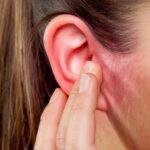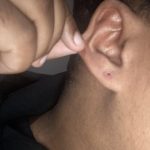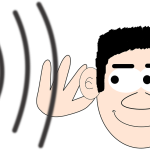Ringing: 5 Common Drugs That Cause Tinnitus

When Jonathan took a course of erythromycin prescribed by his doctor, the last thing on his mind was that this drug would cause him to lose his hearing in one ear, give him hyperacusis (some normal sounds seem very loud) and balance problems and result in horrific bilateral (in both ears) tinnitus.
What is tinnitus?
Tinnitus is a condition in which you hear sounds when there is no outside source of the sounds. The sounds can have many different qualities (ringing, clicking, buzzing, roaring, whistling, or hissing) and can be perceived as soft or loud.
Usually, the person experiencing tinnitus is the only one who can hear the sounds. Tinnitus can occur either with or without hearing loss and can be perceived in one or both ears or in the head. Although the vast majority of drugs do not cause tinnitus in most patients, there is a small group of patients who will have an unexpected – or idiosyncratic – reaction to their medication.
How common is tinnitus?
Approximately 50 million Americans have some form of tinnitus. For most people, the sensation usually lasts only a few seconds or up to a few minutes at a time. For about 12 million people, tinnitus is constant or recurs and interferes with their daily life so much that they seek professional treatment. For these individuals, tinnitus may result in a loss of sleep, difficulty with concentration or reading, and can create negative emotional reactions such as despair, frustration and depression.
People of any age can suffer from tinnitus, although it is not common in children. Everyone who has bothersome tinnitus should have it evaluated by a healthcare provider such as an otolaryngologist and audiologist.

What are the 5 Common Drugs That Cause Tinnitus?
There are more than 450 prescriptions and over-the-counter drugs that can trigger tinnitus, make existing tinnitus worse, or cause another (new) tinnitus sound to appear. Most of the drug classes have tinnitus-causing drugs sprinkled throughout. For example, antibiotics, painkillers, anti-anxiety, and anti-depression drugs, antimalarial medications, anti-cancer drugs, and blood pressure controlling medications, to name a few, can all trigger tinnitus. According to the British Tinnitus organization, these medications can include:
Salicylates: including aspirin and aspirin-containing products are known to cause tinnitus and hearing loss, with the effects being dose-dependent (ie, 2,700 mg or more per day). Topical salicylates containing methyl salicylate also can cause tinnitus. The effects generally can be reversed once the medication is discontinued. Aspirin in large doses has long been recognized as being able to cause tinnitus and indeed researchers use this property to deliberately produce tinnitus in animal experiments. In the normal small dose: used to treat headaches or flu, it is very unlikely that aspirin will cause tinnitus. Similarly, the tiny doses of aspirin that many middle-aged and elderly people take to prevent heart attacks or strokes are extremely unlikely to result in tinnitus.
Aspirin used to be used in much larger doses to treat some rheumatological conditions and when given at these very high doses, tinnitus sometimes did occur. However this effect was generally reversible: once the aspirin was stopped or the dosage reduced, the tinnitus disappeared. Such large doses of aspirin are almost never used nowadays as there are more effective, modern, alternative drugs available to treat these conditions.
A very small number of people are unusually sensitive to aspirin and develop reversible tinnitus at very low doses. Clearly, such people should avoid aspirin and contact their doctor for advice regarding alternative drugs.
Quinine: Quinine and some of the other anti-malarial drugs can occasionally cause damage to the ear when given in high or prolonged doses, such as in the treatment of malaria. However, taken in low doses to prevent malaria or to relieve night cramps, this does not usually happen. In the rare cases where people on these low doses of quinine do report tinnitus, it is temporary and ceases as soon as they discontinue the medication.
Aminoglycoside antibiotics: Aminoglycoside antibiotics, including streptomycin, amikacin, kanamycin, gentamicin, and neomycin are just a few of the aminoglycoside antibiotics known to cause permanent hearing damage. These drugs are not available as tablets, syrups, or other oral preparations and are generally given by injection in hospitals for severe, life-threatening infections. Damage to the ear only occurs when the amount of the drug in the bloodstream exceeds certain levels. For this reason, the level is closely monitored by regular blood tests. However, there are certain conditions such as renal failure when the level of the drug can rise unpredictably and allow dangerous levels to be reached. In these rare circumstances, tinnitus can occur. Aminoglycosides are also a component of some ear drops.
NSAIDs: Most NSAIDs can potentially cause temporary tinnitus and hearing loss, but the toxic effects typically can be reversed once the medication is discontinued. It is important to keep in mind that NSAIDs also can cause kidney injury and reduce renal function, which may increase the risk of ototoxicity when given with other ototoxic medications.
Cytotoxic drugs: The other main group of drugs that can damage the inner ear are the cytotoxic drugs used in treating cancer. Despite the power of such drugs, damage to the ear is surprisingly uncommon. The main group of cytotoxic drugs that can damage the ear is the group containing platinum, including cisplatin and, to a lesser extent, carboplatin and oxaliplatin. The specialist doctors who prescribe such drugs are very well aware of their potential side effects and usually discuss the matter in great detail prior to treatment. Also, where possible, patients receiving such drugs will have their hearing tested on a regular basis to identify any ear damage at an early stage before any serious deterioration occurs.
Loop diuretics: Some other drugs which are occasionally ototoxic are a group of drugs called loop diuretics which are used to increase the production of urine in the treatment of high blood pressure, heart failure, and some kidney disorders. Ototoxicity only occurs with large doses and the relatively small dose given for mild or moderate hypertension (high blood pressure) does not cause damage to the ear. Even with large doses, such diuretics probably only cause permanent damage when used in combination with other ototoxic drugs.
Can recreational drugs cause tinnitus?
There is no evidence that marijuana, cocaine, or heroin usage increases the risk of developing tinnitus. There has been discussion among some patient groups as to whether marijuana could help tinnitus. Although there is not much research on this topic, the evidence that is available suggests that it is not helpful. The use of hallucinogenic drugs and inhalants (solvents) does seem to be associated with an increased risk of developing tinnitus.
Does tinnitus caused by medication go away?
Tinnitus arising from taking ototoxic drugs may, or may not, be permanent. The good news is that tinnitus resulting from taking such drugs is often temporary and goes away in a few days to a few weeks after you stop taking the drug.
How Soon Will the Tinnitus Occur After Taking a Drug?
Tinnitus may show up very quickly after you begin taking an ototoxic medication, or it may take several days for it to become obvious to you. For example, tinnitus from loop diuretics may start just minutes after you begin receiving them intravenously (directly into a vein). In contrast, tinnitus may not show up until two or three days after taking an aminoglycoside antibiotic. Strangely enough, with certain drugs, such as benzodiazepines (a class of tranquilizers), tinnitus may only start after you have stopped taking the drug.
How long does medication-induced tinnitus last?
Hearing loss usually occurs after one to two weeks of treatment, although it often can be delayed up to six months post-treatment. Most NSAIDs can potentially cause temporary tinnitus and hearing loss, but the toxic effects typically can be reversed once the medication is discontinued.





